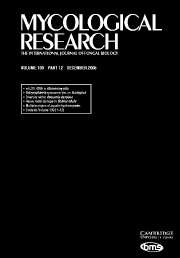Crossref Citations
This article has been cited by the following publications. This list is generated based on data provided by
Crossref.
Vigo, C.
Norman, J. R.
and
Hooker, J. E.
2000.
Biocontrol of the pathogen Phytophthora parasitica by arbuscular mycorrhizal fungi is a consequence of effects on infection loci.
Plant Pathology,
Vol. 49,
Issue. 4,
p.
509.
Uchiumi, Toshiki
Shimoda, Yoshikazu
Tsuruta, Tomoko
Mukoyoshi, Yumi
Suzuki, Akihiro
Senoo, Keishi
Sato, Shusei
Kato, Tomohiko
Tabata, Satoshi
Higashi, Shiro
and
Abe, Mikiko
2002.
Expression of Symbiotic and Nonsymbiotic Globin Genes Responding to Microsymbionts on Lotus japonicus.
Plant and Cell Physiology,
Vol. 43,
Issue. 11,
p.
1351.
Berta, G.
Fusconi, A.
and
Hooker, J. E.
2002.
Mycorrhizal Technology in Agriculture.
p.
71.
Azcón-Aguilar, C.
Jaizme-Vega, M. C.
and
Calvet, C.
2002.
Mycorrhizal Technology in Agriculture.
p.
187.
Xavier, L.J.C.
and
Boyetchko, S.M.
2002.
Agriculture and Food Production.
Vol. 2,
Issue. ,
p.
311.
Vierheilig, Horst
and
Piché, Yves
2002.
Flavonoids in Cell Function.
Vol. 505,
Issue. ,
p.
23.
Pozo, Maria J.
Cordier, Christelle
Dumas‐Gaudot, Eliane
Gianinazzi, Silvio
Barea, Jose M.
and
Azcón‐Aguilar, Concepción
2002.
Localized versus systemic effect of arbuscular mycorrhizal fungi on defence responses to Phytophthora infection in tomato plants.
Journal of Experimental Botany,
Vol. 53,
Issue. 368,
p.
525.
Dalpé, Yolande
and
Monreal, Marcia
2004.
Arbuscular Mycorrhiza Inoculum to Support Sustainable Cropping Systems.
Crop Management,
Vol. 3,
Issue. 1,
p.
1.
Whipps, John M
2004.
Prospects and limitations for mycorrhizas in biocontrol of root pathogens.
Canadian Journal of Botany,
Vol. 82,
Issue. 8,
p.
1198.
Harrier, Lucy A
and
Watson, Christine A
2004.
The potential role of arbuscular mycorrhizal (AM) fungi in the bioprotection of plants against soil‐borne pathogens in organic and/or other sustainable farming systems.
Pest Management Science,
Vol. 60,
Issue. 2,
p.
149.
Jones, David L.
Hodge, Angela
and
Kuzyakov, Yakov
2004.
Plant and mycorrhizal regulation of rhizodeposition.
New Phytologist,
Vol. 163,
Issue. 3,
p.
459.
Vestberg, M.
Kukkonen, S.
Saari, K.
Parikka, P.
Huttunen, J.
Tainio, L.
Devos, N.
Weekers, F.
Kevers, C.
Thonart, P.
Lemoine, M.-C.
Cordier, C.
Alabouvette, C.
and
Gianinazzi, S.
2004.
Microbial inoculation for improving the growth and health of micropropagated strawberry.
Applied Soil Ecology,
Vol. 27,
Issue. 3,
p.
243.
Vierheilig, Horst
2004.
Regulatory mechanisms during the plant arbuscular mycorrhizal fungus interaction.
Canadian Journal of Botany,
Vol. 82,
Issue. 8,
p.
1166.
Vierheilig, Horst
and
Bago, Bert
2005.
In Vitro Culture of Mycorrhizas.
Vol. 4,
Issue. ,
p.
139.
Dalpé, Yolande
2005.
Les mycorhizes : un outil de protection des plantes mais non une panacée.
Phytoprotection,
Vol. 86,
Issue. 1,
p.
53.
Gosling, P.
Hodge, A.
Goodlass, G.
and
Bending, G.D.
2006.
Arbuscular mycorrhizal fungi and organic farming.
Agriculture, Ecosystems & Environment,
Vol. 113,
Issue. 1-4,
p.
17.
Scheffknecht, S.
Mammerler, R.
Steinkellner, S.
and
Vierheilig, H.
2006.
Root exudates of mycorrhizal tomato plants exhibit a different effect on microconidia germination of Fusarium oxysporum f. sp. lycopersici than root exudates from non-mycorrhizal tomato plants.
Mycorrhiza,
Vol. 16,
Issue. 5,
p.
365.
Scheffknecht, Stephan
St-Arnaud, Marc
Khaosaad, Thanasan
Steinkellner, Siegrid
and
Vierheilig, Horst
2007.
An altered root exudation pattern through mycorrhization affecting microconidia germination of the highly specialized tomato pathogen Fusarium oxysporum f. sp. lycopersici (Fol) is not tomato specific but also occurs in Fol nonhost plants.
Canadian Journal of Botany,
Vol. 85,
Issue. 3,
p.
347.
Mukerji, K. G.
and
CIANCIO, A.
2007.
General Concepts in Integrated Pest and Disease Management.
p.
245.
Hooker, J.E.
Piatti, P.
Cheshire, M.V.
and
Watson, C.A.
2007.
Polysaccharides and monosaccharides in the hyphosphere of the arbuscular mycorrhizal fungi Glomus E3 and Glomus tenue.
Soil Biology and Biochemistry,
Vol. 39,
Issue. 2,
p.
680.


